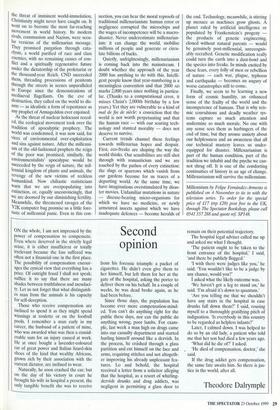Second opinion
ON the whole, I am not impressed by the power of compensation to compensate. Even where deserved in the strictly legal sense, it is either insufficient or totally irrelevant because the loss suffered was often not a financial one in the first place. The possibility of compensation encour- ages the cynical view that everything has a price. Of outright fraud I shall not speak; suffice it to say that there are many shades between truthfulness and mendaci- ty. Len's not forget that what distinguish- es man from the animals is his capacity for self-deception.
Those who receive compensation are inclined to spend it as they might spend winnings at roulette or on the football Pools. I remember a man early in my career, the husband of a patient of mine, who was awarded what was then a consid- erable sum for an injury caused at work. He at once bought a lavender-coloured car of great power and Italian lizard-skin shoes of the kind that wealthy Africans, grown rich by their association with the current dictator, are inclined to wear.
Naturally, he soon crashed the car; but on the day of his victory in court he brought his wife in hospital a present, the only tangible benefit she was to receive from his forensic triumph: a packet of cigarettes. He didn't even give them to her himself, but left them for her at the gate of the hospital, asking the porter to deliver them on his behalf. In a couple of weeks, he was dead broke again, as he had been before.
Since those days, the population has become ever more compensation-mind- ed. You can't do anything right for the public these days, nor can the public do anything wrong, poor lambs. For exam- ple, last week a man high on drugs came into our casualty department and started hurling himself around like a dervish. In the process, he crashed through a glass partition and cut himself on the face and arms, requiring stitches and not altogeth- er improving his already unpleasant fea- tures. Lo and behold, the hospital received a letter from a solicitor alleging that the hospital, as a resort of whirling- dervish drunks and drug addicts, was negligent in permitting a glass door to remain on their potential trajectory.
The hospital legal adviser called me up and asked me what I thought.
'The patient ought to be taken to the front entrance of the hospital,' I said, 'and there be publicly flogged.'
'I wish there were judges like you,' he said. 'You wouldn't like to be a judge by any chance, would you?'
I asked what the likely outcome was.
'We haven't got a leg to stand on,' he said. 'I'm afraid it's down to quantum.'
'Are you telling me that we shouldn't have any stairs in the hospital in case drunks fall down them?' I said, rousing myself to a thoroughly gratifying pitch of indignation. 'Is everybody in this country to be regarded as helpless infants?'
Later, I calmed down. I was helped to do so by an old lady, a patient who told me that her son had died a few years ago.
'What did he die of?' I asked.
'He died of compensation, doctor,' she said.
If the drug addict gets compensation, the same fate awaits him. So there is jus- tice in the world, after all.
Theodore Dalrymple


















































































 Previous page
Previous page